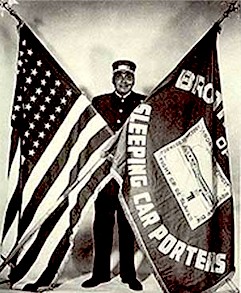Expediting Labor's Demise in the U.S.
Although I never belonged to a union, I grew up with a healthy respect for what they represented. My parents were both blue collar workers, but only Mom was in a union, and it was more than evident in her paycheck, medical benefits and pension. It made a significant difference in my life and in the lives of millions of others. I would sooner stab myself than cross a picket line.
Despite manufacturing's decline in the American landscape, I'm not convinced the Great American Middle Class can be saved, much less revived, without a genuine labor movement - and that's not going to happen without some form of a labor union movement.
Unfortunately, the decline of labor politics - its corruption, bureaucracy, ineffeciency and its failure to adapt to what Alvin Toffler called The Third Wave (i.e. the disorienting shift away from the Industrial Revolution to the Age of Information) - mirrors society's decline into the morass of corporatocracy.
While I don't presume to know what form the rebirth of unionism should take, I have a pretty good idea what will advance its decline -- the restructuring of the AFL-CIO being hawked by James Hoffa, Jr..
Despite his old man's legacy, Little Hoffa reminds me of Joe Biden and Joe Lieberman, egomaniacal sellouts eager to ingratiate themselves to the power brokers and captains of industry regardless of who they may be or what their objectives are. Little Hoffa was quick to cozy up to George W. Bush early on and if union members got anything for his prostitution, I'd certainly like to know what it was.

It's not difficult to understand how grassroots influence will be dealt a serious blow by such a reorg, and the whole thing smacks of a power grab that - while it would simplify the logistics of running existing union operations - will ultimately only serve to expedite organized labor's demise.
Like the Democratic Party, the AFL-CIO is taking its non-white constituency for granted. And as with the Democratic Party, there is a hefty, long-term price to be paid for practicing the politics of exclusion, and all working people - including millions who have yet to enter the workforce - will be footing the bill.
Despite manufacturing's decline in the American landscape, I'm not convinced the Great American Middle Class can be saved, much less revived, without a genuine labor movement - and that's not going to happen without some form of a labor union movement.
Unfortunately, the decline of labor politics - its corruption, bureaucracy, ineffeciency and its failure to adapt to what Alvin Toffler called The Third Wave (i.e. the disorienting shift away from the Industrial Revolution to the Age of Information) - mirrors society's decline into the morass of corporatocracy.
While I don't presume to know what form the rebirth of unionism should take, I have a pretty good idea what will advance its decline -- the restructuring of the AFL-CIO being hawked by James Hoffa, Jr..
Despite his old man's legacy, Little Hoffa reminds me of Joe Biden and Joe Lieberman, egomaniacal sellouts eager to ingratiate themselves to the power brokers and captains of industry regardless of who they may be or what their objectives are. Little Hoffa was quick to cozy up to George W. Bush early on and if union members got anything for his prostitution, I'd certainly like to know what it was.
No Real Labor Reform Without Blacks
Far from ameliorating the crisis afflicting what’s left of organized labor in the United States, a number of “reforms” proposed by some of the nation’s largest unions appear as attempted rollbacks of historic gains won by Blacks, Latinos and women unionists a decade ago. Simply put, the vast changes in AFL-CIO structures demanded by the giant (and heavily minority) Service Employees International Union (SEIU), the Teamsters and others, contain no formal mechanisms to ensure that core labor constituencies have a voice remotely commensurate with their numbers and strategic importance.
The “reformers” demands dominated this week’s just concluded winter meeting of the labor federation’s Executive Council, in Las Vegas, a “fierce” series of discussions in which SEIU chief Andy Stern and his allies called for “streamlining” the AFL-CIO by paring down the number of unions from 58 to 20, drastically shrinking the size of the Executive Council, implicitly reducing the role of state and local labor bodies and, most disastrous for Black unionists, eliminating constituent group representatives on the Executive Committee.
“If the ten largest unions will comprise the Executive Committee, no Black that I’m aware of, or woman that I’m aware of, heads up a union of that size,” said William Lucy, President of the 33-year-old Coalition of Black Trade Unionists (CBTU). “How does our voice get in that decision making process? How do we talk about the value of organizing as a community empowerment process? Who do we discuss that with?”

It's not difficult to understand how grassroots influence will be dealt a serious blow by such a reorg, and the whole thing smacks of a power grab that - while it would simplify the logistics of running existing union operations - will ultimately only serve to expedite organized labor's demise.
“Fifty-five percent (or 168,000) of the union jobs lost in 2004 were held by black workers,” wrote Dwight Kirk, in the February 24, 2005 issue of . “More stunningly, African American women accounted for 70 percent of the union jobs lost by women in 2004. Yes, 100,000 black union women – many the sole or primary breadwinner in their households – lost their paychecks, their job security, medical insurance for their families and their retirement nest eggs in just one year.”
Like the Democratic Party, the AFL-CIO is taking its non-white constituency for granted. And as with the Democratic Party, there is a hefty, long-term price to be paid for practicing the politics of exclusion, and all working people - including millions who have yet to enter the workforce - will be footing the bill.















<< Home